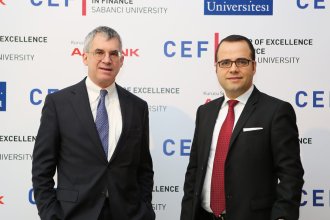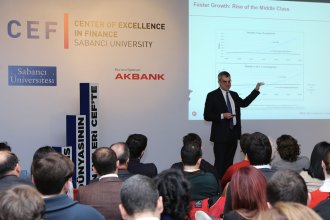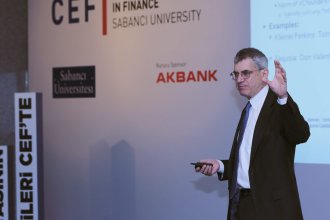CEF, Harvard Business School Entrepreneurial Management Unit Head and Jacob H. Schiff Professor of Investment Banking Josh Lerner on "The Future of Venture Capital and Private Equity."
The Sabancı University Center of Excellence in Finance (CEF) established with the founding sponsorship of Akbank to achieve excellence in finance hosted a lecture by Harvard Business School Entrepreneurial Management Unit Head and Jacob H. Schiff Professor of Investment Banking Josh Lerner at the Sabancı Center on Tuesday, February 28, 2017.
In his lecture titled "The Future of Venture Capital and Private Equity”, Lerner discussed the development of venture capital and private equity over the years, and the current situation. Lerner said that venture capital and private equity did not exist as concepts in the early 1980, and grew exponentially in the last decade. Lerner reminded listeners of the 1987 crash, when the market collapse brought down a number of companies as well. He said that while people were worried that the same thing would happen in the 2008 crash, that crisis proved to be less destructive than the first one. He argued that the reason the 2008 crash was less devastating was the printing of money by central banks. According to Lerner, this helped many agreements survive, and even improve. Josh Lerner said that the venture capital model was disrupted five years ago and a dramatic improvement was achieved.
Lerner's lecture discussed three key points: Where money came from; the rebellion among private equity groups; and the private equity subset, or the private equity model in developing countries.
Josh Lerner said that the investors of private equity funds were seeking ways for direct investment due to the high management costs of funds. They preferred parallel or solo investments rather than investing through a fund. Lerner said, "Direct investment performance was high in the 1990s, but many more people started doing it by the 2000s and performance declined.”
Lerner also stated that although co-investments were expected to be better, they failed due to poor timing. He added that solo investments usually remained local. Speaking on the subject of governance, Josh Lerner made the following remarks:
- Historically, the performance of the highest-tier executives exceeds that of the lower tier.- People who have had a previous success have a repeat success rate of 50%:
- There are deviations in venture capital investments and equity disclosures.
- As the money grows, shareholders become more dispersed.
- Specialized companies are usually more successful than generalized companies.
- The founding generation keeps the economics of a company in its grasp and does not delegate it to the next generation.
- As young and high-performing individuals, the largest segment in the economy, are estranged, decline becomes inevitable. Discussing issues in developing markets, Josh Lerner said, "Asian economies have achieved the highest growth in 35 years. A regression will begin in the next 10 years." Lerner said that while the middle class would remain stagnant in the US and Europe, people in developing countries had high aspirations. Emphasizing the profitability of emerging markets, Lerner said that they offered a good business environment.
About Josh Lerner:
Josh Lerner is the Jacob H. Schiff Professor of Investment Banking at Harvard Business School, and head of the Entrepreneurial Management unit. He graduated from Yale College with a special divisional major that combined physics with the history of technology, and worked for several years on issues concerning technological innovation and public policy at the Brookings Institution. He then earned a Ph.D. from Harvard's Economics Department. Much of his research focuses on venture capital and private equity organizations. He also examines policies on innovation and how they impact firm strategies. He teaches a doctoral course on entrepreneurship, and graduate courses on venture capital and private equity. Among other recognitions, he is the winner of the Swedish government’s Global Entrepreneurship Research Award.




6698 sayılı Kişisel Verilerin Korunması Kanunu (“Kanun”) uyarınca, kişisel verileriniz; veri sorumlusu olarak Sabancı Üniversitesi (“Üniversite”) tarafından aşağıda açıklanan kapsamda işlenebilecektir.
Sabancı Üniversitesi’nin, bilimde, teknolojide ve toplum üzerinde dönüştürücü etkileri olan yenilikçi araştırma ve eğitim faaliyetlerindeki öncü konumu çerçevesinde Sabancı Üniversitesi Finans Mükemmeliyet Merkezi’nin düzenlediği programların (“Program”) bitiminde tarafınıza sunulmak üzere tercihinize bağlı olarak katılım sertifikanızın NFT (non-fungible token) şeklinde hazırlanması arzu edilmektedir. Hızlı gelişen günümüz dünyasında oldukça popüler olan NFT’ler tümüyle dijital nitelikli varlıklar olup, dijital bir varlığın sahipliğini kanıtlayabilen ve bu varlığın benzersiz olduğunu onaylayan, blok zinciri (blockchain) adı verilen dijital defterde depolanan veri birimleridir. Program bitiminde tarafınıza tercihinize bağlı olarak katılım sertifikanızın NFT olarak sunulması amacıyla işlenebilecek kişisel verileriniz ile ilgili olarak sizleri bilgilendirmek isteriz. Bu çerçevede;
Kişisel Verilerin Hangi Amaçlarla İşleneceği ve Hukuki Sebebi
Toplanan kişisel verileriniz, aşağıda yer alan amaçlar (“Amaçlar”) ve hukuki sebepler ile Kanun’un 5. maddesinde belirtilen kişisel veri işleme şartları ve amaçları dahilinde işlenebilecektir.
Bir sözleşmenin kurulması veya ifasıyla doğrudan doğruya ilgili olması kaydıyla, sözleşmenin taraflarına ait kişisel verilerin işlenmesinin gerekli olması hukuki sebebine dayalı olarak;
İlgili kişinin temel hak ve özgürlüklerine zarar vermemek kaydıyla, veri sorumlusunun meşru menfaatleri için veri işlenmesinin zorunlu olması hukuki sebebine dayalı olarak;
Bir hakkın tesisi, kullanılması veya korunması için veri işlemenin zorunlu olması hukuki sebebine dayalı olarak;
Kanunlarca açıkça öngörülmesi ve veri sorumlusunun hukuki yükümlülüğünü yerine getirebilmesi için zorunlu olması hukuki sebebine dayalı olarak;
Açık rızanızın varlığı halinde;
İşlenen Kişisel Verilerin Kimlere ve Hangi Amaçla Aktarılabileceği
Toplanan kişisel verileriniz; yukarıda yer alan Amaçlar’ın gerçekleştirilmesi doğrultusunda kanunlarda açıkça öngörülmesi ve hukuki yükümlülüklerimizin yerine getirilmesi kapsamında kanunen yetkili kamu kurumları ve kanunen yetkili özel kişilere, açık rızanızın varlığı halinde, açık rızanıza dayalı olarak Program kapsamında tarafınıza katılım sertifikanızın NFT şeklinde sunulması amacıyla kullanılan OpenSea NFT platformunun sağlayıcısı sunucuları yurt dışında bulunan Ozone Networks, Inc.’e ve diğer Program katılımcılarına Kanun’un 5. maddesinde düzenlenen kişisel veri işleme şartları çerçevesinde Kanun’un 8. ve 9. maddelerinde belirtilen kişisel verilerin aktarılmasına ilişkin kurallara uygun olarak aktarılabilecektir.
Kişisel Veri Toplamanın Yöntemi
Kişisel verileriniz, Üniversitemiz tarafından yukarıda belirtilen Amaçlar doğrultusunda elektronik ortamda e-posta, çevrim içi formlar, internet sitemiz, tarafınızla gerçekleştirdiğimiz telefon görüşmeleri ve fiziki ortamda katılım formları üzerinden toplanmaktır.
İlgili Kişinin Kanun’un 11. Maddesinde Sayılan Hakları
Kişisel verilerinize yönelik Kanun’un 11. maddesi uyarınca aşağıdaki haklara sahip olduğunuzu bildiririz:
Yukarıda yer alan haklarınıza ilişkin taleplerinizi sizi tanımamıza ve iletişime geçebilmemize yardımcı olabilecek şekilde kimlik (ad-soyad, T.C. kimlik numarası), telefon, e-posta, adres bilgilerinizi de ekleyerek yazılı ve imzalı olarak Sabancı Üniversitesi Orta Mahalle Üniversite Caddesi No:27 Tuzla İstanbul adresine posta ile taahhütlü gönderebilir, şahsen başvurunuzu teslim edebilir veya ilgili başvurunuzu sabanciuniversitesi@hs03.kep.tr adresine güvenli elektronik imzalı olarak iletebilirsiniz. Üniversitemiz talebin niteliğine göre talebi en kısa sürede ve en geç otuz gün içinde ücretsiz olarak sonuçlandıracaktır. Ancak, işlemin ayrıca bir maliyeti gerektirmesi hâlinde, Üniversitemiz tarafından Kişisel Verileri Koruma Kurulunca belirlenen tarifedeki ücret alınabilecektir.